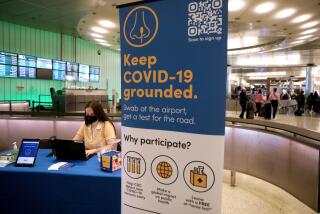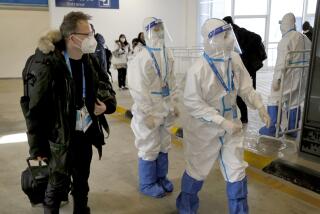Call Centers on Alert for Pandemics
CINCINNATI — Towelettes in packets about half the size of a business card have become a huge commodity for Convergys Corp.
The company is buying the disinfecting wipes by the millions for use by employees of its 72 call centers across the world. The world’s largest call center outsourcing company, which also provides human resources and billing services, considers the towelettes a first line of defense against the threat of a global pandemic from bird flu or other highly contagious disease.
Many U.S. companies with overseas operations have developed contingency plans, such as cross-training employees for multiple jobs and setting up work-from-home systems, while providing employees with regular updates and guidance about bird flu.
The World Bank has estimated that a pandemic could cost the global economy $800 billion, and businesses hit by it could expect months-long absences by 40% to 50% of their workforces.
Communicable diseases are a particular worry at call centers, which often have thousands of employees working phones close together.
“That should definitely be a concern. Flu kills people and spreads like wildfire,” said J.K. Bhattacharjee, a professor emeritus of microbiology at Miami University. “That would be a concern for any kind of concentrated population.”
Convergys, which expects to buy 6 million to 8 million towelettes this year, declined to say how much it’s spending on them. Online sites offer a case of 1,000 for $23.
The company always has provided employees with personal telephone mouthpieces, and has stepped up disinfecting and health measures as bird flu has spread in parts of Asia.
Mary Robinson uses the company-provided antiseptic towelettes to carefully wipe down her entire desk and telephone headset before and after her shifts of calling people with marketing research questions for clients.
That’s now standard practice for all Convergys call center workers, who often share desks. “It’s an easy thing to do to prevent disease,” said Robinson, a nine-year employee in a Convergys center in the Cincinnati suburb of Norwood.
The U.S. Occupational Safety and Health Administration recommends frequent hand washing whenever there is potential for the spread of the bird flu virus, to remove material that might be infectious.
Mark Guan, IBM Corp. international spokesman, said the company, whose operations include a call center subsidiary in India -- where bird flu was confirmed this year in poultry -- wants its employees to be safe but has not had any reason to restrict overseas travel.
“We are following recommendations of the World Health Organization, which has not recommended any limitations on travel to any country,” Guan said.
No human cases have been reported in India, and the government said no new bird flu cases have been reported in the last three months.
India’s largest information technology company, Tata Consultancy Services, said it has contingency plans to shift work from one location to another as needed. Spokesman Pradeepta Bagchi said the company, with software development in countries including China, has held several informational briefings on bird flu for employees.
Bhattacharjee noted that the bird flu virus had not mutated into a virulent strain that could be easily spread among humans, but he said even seasonal flu can sicken millions of people, thousands fatally.
The bird flu virus remains hard for people to catch, and most human cases have been traced to contact with sick birds. The WHO says bird flu has killed at least 134 people worldwide since it started ravaging Asian poultry stocks in late 2003. Indonesia and Vietnam have been the hardest-hit countries, with at least 42 human deaths each.
However, just the threat can be unnerving, as when bird flu was found in Indian poultry in March.
“People were extremely aware and sensitive. There was a lot of publicity, a lot of scared people even in our own office,” said Rashmi Sharma, director of human resources for Convergys in India, where the company has more than 11,000 employees.
The company cafeteria, like many surrounding restaurants and hotels, initially stopped offering chicken, she said by telephone from New Delhi. However, as more was learned about the virus -- properly cooked poultry is considered safe -- and how to prevent it, fears died down.
“We have fairly clear guidelines that include the level of hygiene we need to follow to make sure we are dealing with this,” Sharma said, adding that sensitivity about health issues is part of call center operations in warm-weather climates where viruses can flourish.
The company does pre-employment medical screening and checkups during employment, and makes sure employees showing symptoms such as coughing are sent home immediately.
With operations in 30 countries, Convergys has dealt with a range of catastrophes beyond health issues, including the Asian tsunami of 2004 and severe hurricanes in Florida the last two years. Carol Fox, senior director of risk management, said widespread power outages and displaced employees forced the company to use its network technology to reroute calls to other centers.
“Our attendance was down, but we were able to continue serving clients,” she said.
Although the company feels ready for a pandemic, it recently began practicing scenarios based on fictitious human-to-human bird-flu transmission. Backup communications systems, call rerouting and working at home are among the options being readied.
But Fox said the best preparation is in the hands of employees.
“What we’re doing from a prevention standpoint is really emphasizing the hygiene -- using the sanitizing wipes,” she said.
More to Read
Inside the business of entertainment
The Wide Shot brings you news, analysis and insights on everything from streaming wars to production — and what it all means for the future.
You may occasionally receive promotional content from the Los Angeles Times.










